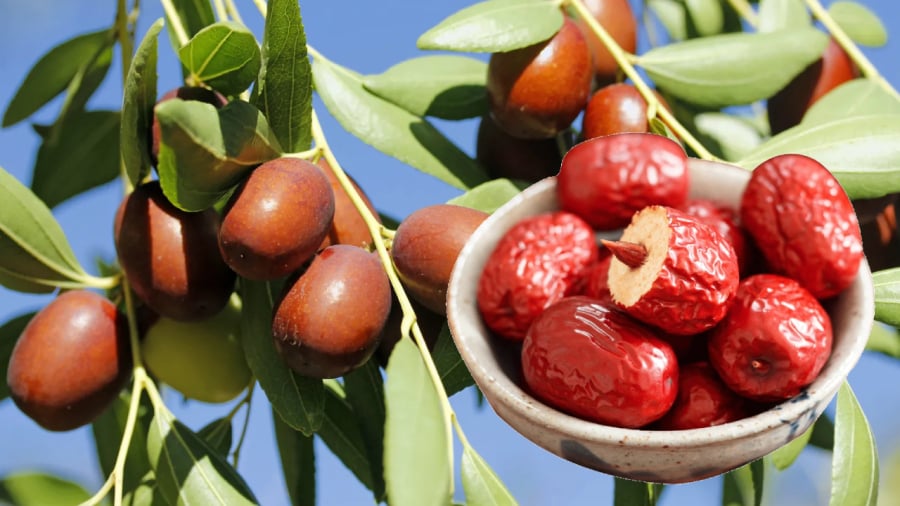The Health Benefits of Dried Red Dates
According to ThS.BSNT. Le Thanh Hang and ThS.BSNT. Pham Duc Thang from Ho Chi Minh City University of Medicine and Pharmacy, red dates (also known as jujubes) are the ripe fruits of the Zizyphus sativa Mill tree, belonging to the Rhamnaceae family. This tree is native to South Asia and is now cultivated in many parts of the world. Red dates have a sweet taste, a warm nature, and are believed to benefit the spleen and stomach, tonify the spleen, and nourish the body according to traditional medicine.
Dried red dates are used as a medicinal herb and are also a popular cooking ingredient in nutritious and delicious dishes.
Modern scientific research has revealed that red dates are low in calories but packed with vitamins and minerals. A 100-gram serving provides 0.2 grams of fat, 1.2 grams of protein, 20.2 grams of carbohydrates, 250mg of potassium, and 69mg of vitamin C. Additionally, this fruit contains essential minerals such as calcium, magnesium, and phosphorus, along with a good amount of B-complex vitamins.

Consuming red dates offers several potential health benefits, including:
- Improved digestion
Red dates contain saponin, triterpernoid, and fiber, which help enhance digestion, prevent constipation, improve nutrient absorption, and promote a healthy gut.
- Better blood circulation
Rich in iron and phosphorus, red dates stimulate red blood cell production and improve blood circulation. They also contain alkaloid and triterpenoid compounds that help purify the blood and remove toxins.
- Antibacterial and antiviral properties, boosting immunity
The flavonoids and vitamin C in red dates exhibit antibacterial effects, preventing the entry of harmful bacteria and viruses into the body. Additionally, polysaccharides in red dates scavenge free radicals and slow down the oxidation process in the body, thereby enhancing overall immunity.
- Nervine and sleep-improving qualities
Red dates contain phenolic compounds, saponins, and flavonoids, which have a calming effect on the nervous system, helping to soothe anxiety and improve sleep quality. The active compounds in red dates also support brain function and protect brain cells, leading to enhanced memory.
2 Important Precautions When Consuming Red Dates
- Individuals with digestive issues should consume red dates in moderation
Those with digestive problems, especially those with indigestion or stomach ailments, should be cautious about consuming red dates. This fruit is high in fiber and natural sugars, and excessive consumption, especially in the evening, may cause bloating or aggravate stomach conditions for those with sensitive digestion.
- Diabetics should limit their intake of red dates
While red dates are highly nutritious, they are not suitable for individuals with diabetes due to their high glycemic index. Consuming large amounts of red dates can rapidly increase blood sugar levels, negatively impacting the health of diabetics.

Additional Considerations When Consuming Red Dates
Dr. Huynh Tan Vu, a specialist from the Ho Chi Minh City University of Medicine and Pharmacy – Branch 3, notes that red dates are generally safe and non-toxic, but excessive consumption may lead to side effects. Red dates can be used in herbal remedies and are commonly added to nutritious dishes like chicken stews, porridge, soups, and sweet desserts.
Red dates can be used fresh or dried, depending on the recipe or medicinal purpose. They are often combined with other herbs, boiled, and consumed as a tea. The typical dosage is around 5-10 fruits per day, but this may vary depending on the individual’s needs and the intended use.
What Are the Health Benefits of Perilla Leaves? Who Should Avoid Consuming Them?
Perilla frutescens, commonly known as perilla or tia to, is a versatile herb with a plethora of uses beyond its flavorful profile. With a rich history in traditional medicine, perilla is more than a culinary herb; it is a powerhouse of nutrients that boosts overall health, strengthens the immune system, and aids in the treatment of various ailments.





































